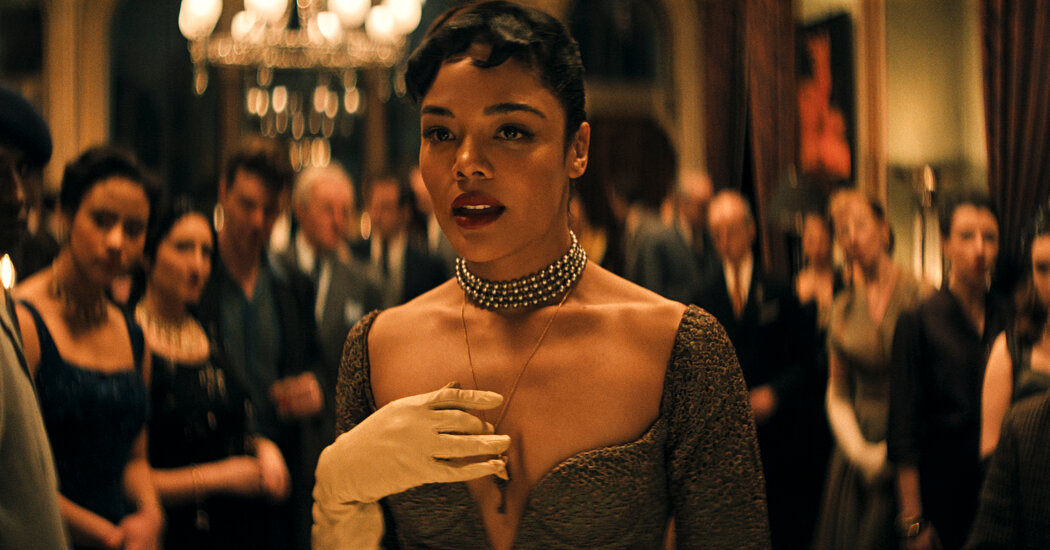In “Hedda,” Nia DaCosta’s startling and seductive variation on the bourgeois tragedy, Tessa Thompson swans around a sprawling country estate in a gown with a plunging bodice. A pair of necklaces encircle her: a chain with a key pendant and a silver-beaded choker. Both pieces evoke war. The choker resembles weaponry, or chain-mail armor; the key unlocks the gun safe. The occasion for the regalia is a social gathering in 1950s England, but it feels like the eve of battle.
A liberally modified adaptation of Henrik Ibsen’s play “Hedda Gabler,” the film is set over a single night as two newlyweds host their first party as a married couple. George (Tom Bateman), a lickspittle and man of letters, is desperate for the evening to impress his senior scholars and earn him a promotion. “Nothing can go wrong,” he insists to his wife, Hedda (Thompson), in what amounts to more of a plea than a demand. She simpers. A biracial woman born to a general out of wedlock, Hedda settled for George for the sake of stability. But all she really wants is to have fun.
How Hedda achieves her goal is the subject of DaCosta’s bacchanal of carousing and carnage, which follows the hostess as she sets an obstacle course of mind games and then observes her cohorts — mostly the female ones — edge their ways through it. Trailing Hedda across the gilded ballroom and mahogany library, into corners and up and down the carpeted staircase, DaCosta wants to survey how clever women cope with being a captive of their circumstances. What gets suppressed, and what is set loose?
Lust and rage, for two things. In “Hedda,” their release is hastened by the arrival of Eileen (a regal Nina Hoss), Hedda’s former lover who’s up for the same faculty job as George. Once a lush, Eileen has recently pledged sobriety, and she hopes that her reformed image along with her new book manuscript — which includes major research into people’s private sexual fantasies — will win her the position. But this is Hedda’s house, and there, sex is rarely private and is always close to violence. That link is echoed in Hildur Gudnadottir’s spectral score, which layers percussion with moaning that could be the sounds of orgasm or agony.
While DaCosta’s intelligence as a writer and director makes “Hedda” a standout film, her penchant for play makes it a delightful one. Sometimes, she wields her camera like a martini in the white-gloved hand of a party guest, as in a riotous ballroom scene set to a live rendition of “It’s Oh So Quiet.” Soon after that, when Hedda spots Eileen for the first time, she drifts forward on a conveyor amid a blurred background, as if pulled by magnetic attraction. This sense of mirth extends to the dialogue, in which DaCosta’s zingers rival Ibsen’s. One highlight: Hedda asks Eileen, “Don’t you miss me?” and Eileen ripostes, “Like an appendix.”
All of the women in “Hedda” are power-seeking, and their status as sex objects ogled by the men around them serves as a catalyst for authority and as an obstacle to their progress. Getting what one wants is exhausting work, and as the night wears on, things get messy for Hedda and Eileen. Their tension is elevated by the presence of Eileen’s new paramour and co-author, Thea (Imogen Poots, doing her best impression of dowdy), a beta whose devotion to her alpha is at once romantic and strategic. She sees their collaboration as an escape from her own domestic misery.
That Thea does not suffer a side character’s fate but instead emerges with desires of her own is as fine an example of DaCosta’s directorial wisdom as any decision in “Hedda,” big or small. Here is a film for adults that, like its protagonist, doesn’t skimp on brainpower, but never forgoes an opportunity for pleasure, either. Fireworks burst, guns discharge, the claws come out and polite society turns in on itself. They say that lying is the second most fun a girl can have.
Hedda
Rated R for mischief that turns to mayhem. Running time: 1 hour 47 minutes. Watch on Prime Video.
The post ‘Hedda’ Review: Sex, Lies and a Country Estate appeared first on New York Times.




